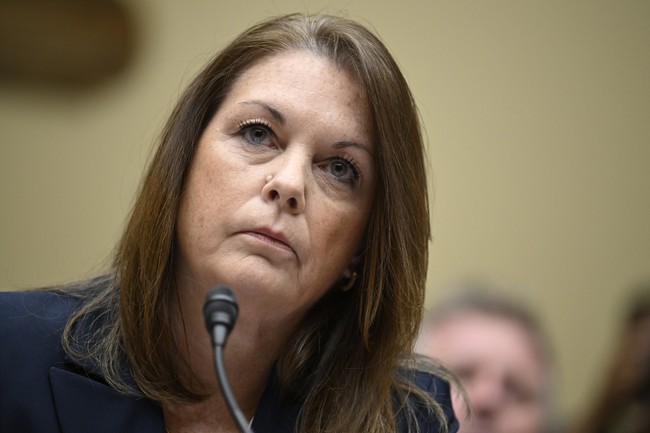


Everybody in America knows about the horrendous failure of the United States Secret Service (USSS) to protect former President Donald Trump during his recent campaign rally in Butler, Pa., where he came within an inch of being assassinated.
But you likely know nothing at all about the USSS's failures before and during the January 6, 2021, riot at the U.S. Capitol. The recently released redacted version of the investigation by the Department of Homeland Security (DHS IG) exposes a bureaucratic coverup of the worst kind.
If you are surprised or puzzled to hear that the USSS, which is normally associated primarily with protecting presidents of the United States, had a role in the riotous events of January 6, recall that Vice President Mike Pence had to be in the Capitol to certify Electoral College results of the 2020 presidential election.
Vice President-Elect Kamala Harris visited the Democratic National Committee (DNC) headquarters, which is close to the Capitol grounds' congressional office buildings on the House side.
The investigation by the FBI and the USSS to determine who planted the pipe bombs found at the DNC and near the Republican National Committee (RNC) building and why they did so remains incomplete and thus a failure, very much like the USSS's failed investigation of the cocaine found in the White House.
The American public is now able to read the IG's report on the Secret Service's January 6 failures only because House Administration's Subcommittee on Oversight Chairman Barry Loudermilk (R-Ga.) forced Alejandro Mayorkas to provide the document to Congress, telling the impeached-but-not-convicted DHS Secretary in a January 24 letter:
The Subcommittee independently obtained confirmation that the United States Secret Service Preparation for and Response to the Events of January 6, 2021, report is complete. Additionally, we are aware that the Secret Service has reviewed and cleared this report.
Therefore, you alone are preventing the DHS IG from releasing this report to Congress. Given the events of July 13, 2024, yet another security failure by the U.S. Secret Service (USSS) to detect and prevent a serious threat to a protectee, there is absolutely no justification for your delay.
In other words, it was only after the nearly successful assassination of Trump that Mayorkas allowed the IG report to be conveyed to Congress. Such obstruction is condemnable on two counts:
First, Congress is the first branch of the federal government. Properly led in the employment of its constitutional leverage, Congress has the unquestioned right to obtain any document produced by any department or agency in the executive branch. As Kendall and Carey wrote in their invaluable treatise, "Under the Constitution, Congress has all the ultimate weapons in any showdown with either of the other two branches."
Second, the Inspectors-General Act of 1978 — one of the most significant accomplishments of President Jimmy Carter's single term in the Oval Offce — requires the IGs to answer to Congress, not to department heads like Mayorkas.
Yes, Mayorkas had final approval on making the report official, but, given congressional intent in making the IGs answerable to Congress, the law clearly envisions such delays as unacceptable. And Mayorkas' delay clearly was not for legitimate purposes, as Loudermilk made clear:
Based on information provided to this Subcommittee, since Secretary Mayorkas was confirmed in 2021, DHS has repeatedly obstructed, delayed, or denied the ability of the DHS OIG to conduct effective oversight, as is mandated by the Inspector General Act of 1978. Such examples include refusing to provide documents on the grounds of the Presidential Records Act and the Privacy Act, as well as instructing DHS employees not to provide documents directly to the DHS OIG.
Loudermilk's assessment of the most significant findings of the report include:
- Former USSS Director Kim Cheatle systematically sought to obstruct the IG investigation into the Secret Service's preparations prior to January 6 and operations on the day of the riot. According to the Georgia representative, "Cheatle also wrote that USSS wanted to internally review records before USSS employees provided the records to the DHS OIG. This is highly questionable and could have prevented USSS employees from being fully transparent with the DHS OIG."
Loudermilk then added this observation regarding Cheatle's efforts to obstruct the IG:
Additionally, Cheatle cited the DHS OIG’s request for communications from 'most senior levels of Secret Service leadership' including the Director, and Deputy Director, and one DHS OIG request as one reason they did not comply. It is not clear why Cheatle thought that the senior-level leadership at USSS should be exempt from the DHS OIG’s scrutiny. (Emphasis added).
Cheatle's efforts to delay and obstruct are classic illustrations of one of the most seriously damaging characteristics of bureaucracies — their obsessive avoidance of genuine accountability.
- The USSS claimed it could not provide Congress with copies of hundreds of communications among the agency's senior executives regarding the preparation for and execution of its January 6 operations because of a previously planned data migration effort.
But Loudermilk notes that the first requests from Congress for those documents came on the day of the riot, which was before the data migration effort even began. Worse, the Secret Service "does not explain why the department did not pause or cancel this data migration given the events of January 6 and after receiving preservation letters from congressional committees," he said.
- The Secret Service did not explain to the IG why no backups were kept of those key communications among senior executives and did not tell the IG until more than a year after the January 6 riot that the documents were unavailable.
The preceding points are only three of the many put forward by Loudermilk. The next hugely important question is this: It being an election year, the 118th Congress is unlikely capable of responding appropriately to these disturbing revelations.
So what will the 119th Congress do about them?
